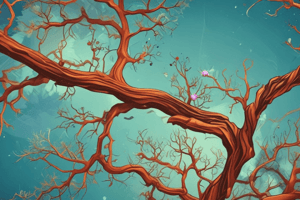Podcast
Questions and Answers
What is the study of the relationships between organisms and their environment?
What is the study of the relationships between organisms and their environment?
- Botany
- Ecology (correct)
- Microbiology
- Genetics
What is the process by which cells generate energy from the food they consume?
What is the process by which cells generate energy from the food they consume?
- Metabolism
- Respiration (correct)
- Photosynthesis
- Homeostasis
What are molecules that contain the genetic instructions for an organism?
What are molecules that contain the genetic instructions for an organism?
- Proteins
- Nucleic Acids (correct)
- Carbohydrates
- Lipids
Flashcards are hidden until you start studying
Study Notes
Branches of Biology
- Botany: study of plants and their interactions with the environment
- Zoology: study of animals and their interactions with the environment
- Microbiology: study of microorganisms such as bacteria, viruses, and fungi
- Ecology: study of the relationships between organisms and their environment
- Genetics: study of heredity and variation in organisms
- Biochemistry: study of the chemical processes that occur within living organisms
- Molecular Biology: study of the structure and function of biological molecules such as DNA, RNA, and proteins
- Cell Biology: study of the structure, function, and behavior of cells
- Evolutionary Biology: study of the processes that have shaped the diversity of life on Earth
Key Concepts
- Cell Theory: all living organisms are composed of one or more cells, cells are the basic units of life, and all cells arise from pre-existing cells
- Homeostasis: the ability of an organism or system to maintain a stable internal environment despite changes in the external environment
- Heredity: the passing of traits from one generation to the next
- Evolution: the process of change in the characteristics of a population over time
- Photosynthesis: the process by which plants and some other organisms convert light energy into chemical energy
- Respiration: the process by which cells generate energy from the food they consume
Biological Molecules
- Carbohydrates: energy-rich molecules used by cells for energy and structural purposes
- Proteins: molecules that perform a wide range of functions in cells, including catalyzing reactions and replicating DNA
- Lipids: molecules that serve as energy storage and provide structural components of cells
- Nucleic Acids: molecules that contain the genetic instructions for an organism (DNA and RNA)
Biological Processes
- Metabolism: the chemical reactions that occur within cells to maintain life
- Growth and Development: the processes by which an organism grows and develops from a single cell to a mature adult
- Response to Stimuli: the ability of an organism to respond to changes in its environment
- Reproduction: the process by which an organism produces offspring
Branches of Biology
- Botany studies plants and their environmental interactions
- Zoology focuses on animals and their environmental interactions
- Microbiology examines microorganisms like bacteria, viruses, and fungi
- Ecology explores relationships between organisms and their environment
- Genetics delves into heredity and variation in organisms
- Biochemistry studies chemical processes within living organisms
- Molecular Biology examines structure and function of biological molecules (DNA, RNA, proteins)
- Cell Biology investigates structure, function, and behavior of cells
- Evolutionary Biology explores processes that shaped life on Earth
Key Concepts
- Cell Theory: all living organisms consist of one or more cells, cells are life's basic units, and cells arise from pre-existing cells
- Homeostasis: ability of an organism or system to maintain internal stability despite external changes
- Heredity: passing of traits from one generation to the next
- Evolution: process of change in population characteristics over time
- Photosynthesis: conversion of light energy into chemical energy by plants and some organisms
- Respiration: energy generation from consumed food by cells
Biological Molecules
- Carbohydrates: energy-rich molecules for energy and structural purposes
- Proteins: molecules with various cellular functions (catalyzing reactions, replicating DNA)
- Lipids: energy storage and structural components of cells
- Nucleic Acids: genetic instructions for an organism (DNA and RNA)
Biological Processes
- Metabolism: chemical reactions within cells for life maintenance
- Growth and Development: process from single cell to mature adult
- Response to Stimuli: ability to respond to environmental changes
- Reproduction: process of producing offspring
Studying That Suits You
Use AI to generate personalized quizzes and flashcards to suit your learning preferences.




